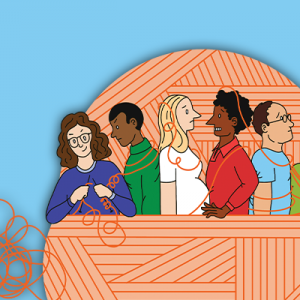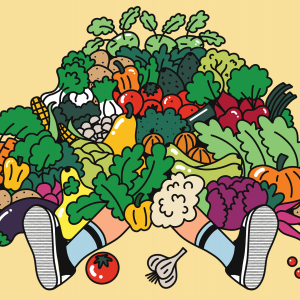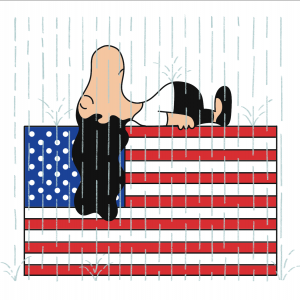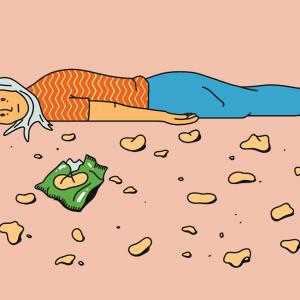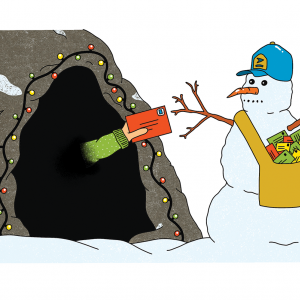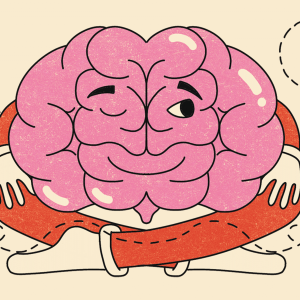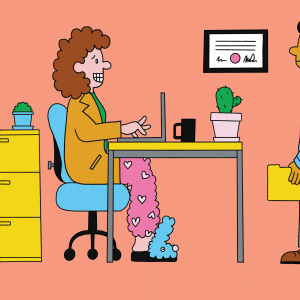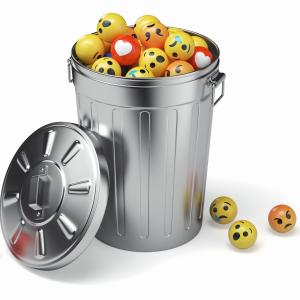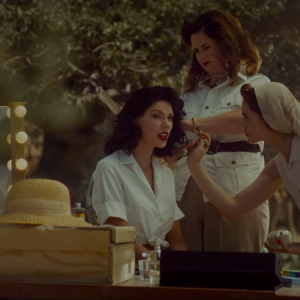
Beth Cooper-Chrismon was director of individual giving at Sojourners. (You may have received emails from her; she crafted every one of them lovingly by hand.)
Beth worked at Sojourners from April 2015 to July 2025 and served as the donor services associate, database administrator, and supervisor of the donor services team. Previously, she worked as a major donor prospect researcher for political and nonprofit clients.
Beth lives in Washington, D.C., where she enjoys weightlifting, loud guitar music, Dungeons and Dragons, and critically acclaimed MMORPG Final Fantasy XIV.
Posts By This Author
Warning: I’ve Got Joy! (Somewhere in Here)
My humor exists because of my inner darkness, not in spite of it.
I THOUGHT I understood “joy is an act of resistance” — a phrase first coined by poet Toi Derricotte — like the back of my hand. As someone who is neurodivergent and queer, my existence is political, and my thriving is defiant. Every joke I make, in particular my bad jokes, I make with a wink at all my haters. (The moral arc of the universe bends away from you and toward my bad jokes.)
That, surely, is joy as resistance — being ridiculous when many would rather I be dead. I feel this in my bones. Surely, I thought as I sat down to write this month’s column, I understand this concept well enough to teach my beloved readers how to achieve it in their own lives.
Friends, it turns out I do not actually feel this in my bones. It would be an understatement to say I struggled to write this column. I had to journal about it, talk it out with friends, and take a good long look at myself in the mirror to get to the heart (or the bones, I guess) of the problem, which was, surprisingly, a lack of feeling. A lack of bones? This metaphor is getting away from me.
An Unofficial and Useless Guide to Building Community
Every societal issue can be solved with a good list.
STUDY AFTER STUDY and book after book tells you that modern society has a community-support problem. People are lonelier and more isolated than ever and are expected to solve these collective and societal problems by themselves. But you don’t have to do this alone. You can do this with the support of my handy guide to community building!
Allow me to propose some ideas for how to create your own community-support network when every thread in the fabric of American society seems designed to keep you from it.
□ Search relevant terms on Google such as: “What is community?” and “What is community support?” Start a discussion group to answer these questions. Congratulations! You now have a community of people who love to argue in circles. Consider turning this into a Bible study.
I Am Drowning in Vegetables
This is not a horror movie. This is a CSA subscription.
THE VEGETABLES ARE trying to kill me. I am drowning in vegetables. I clock out of my home office, and there are the vegetables. I take weekend trips, come home, and there are the vegetables. I can’t sleep, because deep in the corners of my mind, the vegetables are there — slowly rotting, mocking me, blaming me for their inevitable demise.
This is not a horror movie. This is a CSA subscription.
Short for “community-supported agriculture,” CSAs provide subscribers a selection of farm-fresh seasonal produce every week. They are a sustainable and often cost-effective way to eat local and give back to your community. They are also a terrific way to spend hours chopping vegetables and Googling “kohlrabi.”
In the pre-pandemic years, I, a black-and-white-moral-thinking-trying-to-do-right no-matter-the-cost twentysomething, signed up for a CSA every spring. Rarely have I experienced more anxiety, more rage, and more helplessness than when faced with a brand-new “single-sized” (but still enormous) bag of produce while most of the previous week’s veggies remained untouched and rapidly softening. Yet I, ever the Good Consumer, stressed myself silly over produce season after season, because what choice did I have? I couldn’t destroy the planet.
The Five Stages of Grief When You Aren't Selected For a Jan. 6 Jury
I am the most law-abiding citizen of the United States re: God's law. Shouldn't that count for something?
YOU THOUGHT YOU were going to be selected for the trial of some of the fascists who staged an insurrection at the nation’s Capitol on Jan. 6, 2021. You went through jury selection and everything! But for some reason (maybe your use of the word “fascists”), they turned you down. What’s next?
Here’s what to expect when you’re expecting Jan. 6-jury-related grief:
1. Denial
C’mon. There’s no way. Why wouldn’t they want me? I am a morally upright and very impressive person who has all the right opinions and does all the right things. I am a good Christian who believes that God’s law is what matters most, and I will do the right and just thing even when it is against human law. I am the most law-abiding citizen of the United States re: God’s law. Which is totally relevant to what the judge is looking for. Totally.
Powerlifters for Christ
The whey, the truth, and the life.
I LIFT WEIGHTS and I am a Christian, which means every day I have to ignore the norms of what makes a “good Christian” and a “fit person” and instead follow my own compass and live how I choose. But what if I didn’t? What if instead, through the power of televangelism and protein powder, I turned into the pinnacle of both conservative Christianity and weightlifting culture: a white male Incredible Hulk, a powerlifter for Christ?
What follows is a dispatch from the alternate reality in which this transformation occurred. Look upon it with awe and dread. Don’t let this happen to you.
I AM A POWERLIFTER for Christ. My reps and my PRs ascend to the highest heaven. My delts are for the Divine, my pecs for the Promised Land, my triceps for the Trinity. (Truly I tell you, this makes my triceps confusing.)
Were you to ask: “Do you lift His name on high?” I would answer, “Yes, my brother in Christ, bring it in.” And we would embrace like true godly men, slapping each other’s backs to remind each other and ourselves that we are violent and therefore heterosexual.
It is written (upon my workout shirts): “Reps for Jesus,” “Hallowed Be Thy Gains,” “Jesus Lifts.” So, to you I must ask: Wherefore art thy gains?
Getting to #Blessed in 5 Easy Steps
How to keep going and become a glorious serotonin vampire.
WHAT DO YOU MEAN, “How to keep going,” you may ask? I’m fine, you may say. The increasingly fraught political landscape, the ominous signs of climate change, the erosion of voting rights, the crushing “invisible hand” of global capitalism, and a lack of space to collectively process any of the above — these are all things that are totally fine and normal and do not bother you. Your eye is not twitching right now as you say this.
Hush, you. I made a list of five easy steps to help you keep on keeping on. Read it and weep. I mean, stop weeping.
Now More Than Ever
Alms for the swear jar?
DECEMBER IS A stressful time for fundraisers, as a significant percentage of most nonprofits’ annual revenue comes in during the holiday season. We made a mistake this month when we asked Beth, who does much of Sojourners’ online fundraising, to write a humor column for this issue. Instead of a humor column, she sent us the following, in an envelope with a return address of “a cave in the woods; do not look for me.” We hope she’s doing okay. — The Editors
Dear Potential Supporter,
Now more than ever. This holiday season. In this moment, this urgent time, the most crucial of moments that all of us are in, right now. (Yes, you too.) Now — today — more than ever — Sojourners needs your year-end donation.
Did you know that the average American hears the phrase “now more than ever” 500 times a day? Did you know that all other organizations who use the phrase “now more than ever” are copying us, and we used it first? (Did you know that I, a fundraising professional hiding inside a cave, am both deeply normal and a trustworthy source of information?)
I Tried Mindfulness, the Wonder Drug
You'll never guess what happened next ...
READERS, I AM here to tell you about My Mindfulness Journey, but not in an annoying way, guaranteed or your money back. (Please keep reading. It’ll be different this time.)
But, before we get to mindfulness—aware of Carl Sagan’s comment, “If you wish to make an apple pie from scratch, you must first invent the universe”—we will need to invent my brain, or at least take some major psychological detours. Which is appropriate, since ADHD is all about detours.
Oh, wait. Got ahead of myself there. Let’s start at the beginning.
My 2020 experience was a typical one, in that I spent 100 percent of it in my home and/or in untenable personal and professional situations. Switching to working from home utterly destroyed my routines and support systems. The accompanying collapse of my productivity, mood, and mental health prompted my therapist to ask if I’d ever considered that I might have Attention-Deficit/Hyperactive Disorder, or ADHD.
ADHD is a neurodevelopmental disorder that affects attention regulation, executive function, working memory, and a host of other issues—seemingly designed with the express purpose of embarrassing me in front of my boss.
In the months following my diagnosis, I analyzed my habits with the eye of a quality control inspector, dumbstruck by the breadth and scope of this particular unit’s malfunctioning. “How have I survived all this time?” I wondered almost daily. “And surely one of these ‘normal’ people could give me a scrap of their extra dopamine? For a good cause?”
At the same time, I realized: You know what would be a great way to help me learn to live with an overactive and unpredictable brain? Mindfulness.
The (Not So) Great Reintegration
Are we as a country capable of abandoning sweatpants, after all they've done for us?
AS MORE AND MORE more of us who are still working remotely receive the COVID-19 booster, and as more effective treatments are developed and omicron fades into distant memory (one can always hope), the threat of returning to “normal life”—offices, restaurants, bars—looms on the horizon. White-collar workers across the nation are looking upon their professional shoes and slacks with fear and dread. Are we as a country capable of abandoning sweatpants, after all they’ve done for us?
We have grown accustomed to a softer, smaller world, a comfortable and blanket-filled cocoon of our own making, but soon we will reenter a world that is both freer and crueler. A world where people see our faces when we walk by and (God forbid) try to start conversations with us. A world where people hug us without asking first. A world where, for some reason, we are expected to make small talk. Calvinists and non can surely agree that this is depraved.
It will be difficult to return to professional lives that involve arduous and near-mythical rituals of the before-times such as “commutes” and “dress codes” and “supervisors who know how late we sleep in.”
Grief and Cheap Grace in ‘WandaVision’
Grief is a powerful, disorienting thing, as so many can attest this second Lenten season of a global pandemic that has claimed more than 2.5 million lives. “I’m so tired,” says Wanda Maximoff in the penultimate episode of Disney+ and Marvel Studios’ hit show WandaVision. “It’s just like this wave washing over me again and again. It knocks me down, and when I try to stand up, it just comes for me again. And I … it’s just gonna drown me.” Wanda is referring to the loss of her twin brother, Pietro, but the picture of grief is familiar.
'Avengers: Endgame' Is a Love Letter to Human Imperfection
The first line of Avengers: Endgame is “Do you know where you’re going?” And the story that follows, the final chapter of a saga 11 years in the making, is an attempt by the deeply flawed, deeply human protagonists at wrestling with that question — what is our path, do we know it, and can we change it?
I Gave Up Social Media For Lent, and I'm Here to Tell You: That Was a Great Choice
May this insight be useful to you all. And may you feel minimally conflicted when you share it on Facebook.
The Oppressive Whiteness of Taylor Swift's 'Wildest Dreams'
Taylor Swift’s controversial new music video, “Wildest Dreams,” is intended to evoke awe of the “wildest” of African landscapes: pure natural beauty, “undiscovered” and “untarnished” — and entirely without Africans.
Perhaps because this video launched soon after Ms. Swift’s recent race- and privilege-related feud with Nicki Minaj, or because at the time of writing, the video has reached nearly 25 million views since its release on Aug. 30, response to the video has been intense. Reading articles on both sides was a conflicting experience, as a young white woman raised on fashion magazines, classic cinema, and the idealization of “old Hollywood.” Can we love and appreciate those films without endorsing that oppression? Is it possible to create an homage to them without endorsing them entirely? In short — how can we free ourselves from the cognitive dissonance of outwardly condemning racism, misogyny, and colonialism while still internally glorifying images and ideals that are built upon them?
The answer to this question may lie in other, more nuanced, portrayals of midcentury American culture.

